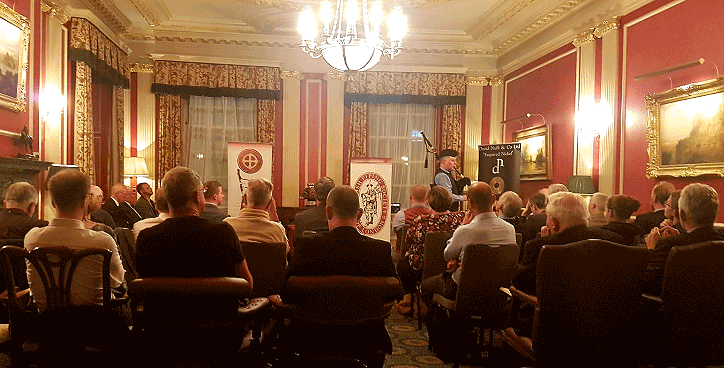
By John Shone
The 80th Annual London Competition was held this year, for the first time, at the Caledonian Club, Halkin St., Mayfair, SW1. This is a very prestigious address and I think turned out to be most satisfactory. The Vice President of the Society, Billy Wardrope, had the unenviable job of finding a replacement venue for Kensington Town Hall which had become unavailable.
The Caledonian Club (pictured above) proved itself to be just right and hopefully could become the permanent home for the annual SPSL competition.
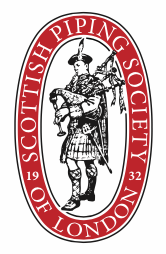
This year the contest was run over two days, the prestigious Bratach Gorm contest, sponsored by the Piobaireachd Society, being held on the Friday evening and all other contests on the Saturday.
The Bratach Gorm: Nine of our top professional players competed, judged by Dr Bill Wotherspoon, Christopher Armstrong and, sitting as the senior judge, Mr Andrew Wright. I suppose one criticism of the room in which it was held was its size. If an audience had materialised numbering that of 20 years ago it could not have accommodated it! The room itself was, as one would expect in a gentleman’s club, plush and with excellent acoustics for the pipe.
What a wonderful contest it was. By the time we came to the last piper I felt genuinely sorry for Andrew Wright and his fellow judges having to decide between such excellent playing.
Well now to the contest. First on was Roderick MacLeod MBE, and he was asked to play ‘The Lament for Patrick Og’. His pipe was just magnificent, and in tune from the start and it stayed that way right through this classic piece. He set a good tempo from the start and maintained our interest to the finish. To find fault is difficult in the extreme, but perhaps he had one catch on a B and one hiharin slightly indistinct. But this was a top performance nevertheless.
Second to play was William McCallum with ‘The Rout of the Lowland Captain’. Again the pipe was in tune from beginning to end, his hiharins were quite excellent and an example for any learner to copy. The tempo of the tune was again just right and by the end we all felt for the ‘Captain’.
Next was Callum Beaumont, probably the youngest competitor of the evening. He was asked to play that very long and melodic piece ‘The Lament for the Earl of Antrim’. Calum’s F, at the start of the tune, was not quite in harmony with the rest of his pipe, but soon settled down, and by the end of the first line his sensitive and professional presentation had won the attention of most listeners in the room. Callum is young enough to challenge the great Donald MacPherson’s records at Inverness and Oban, and if he maintains his current form and enthusiasm could do so. The presentation of the piece was superb and he became a worthy winner.
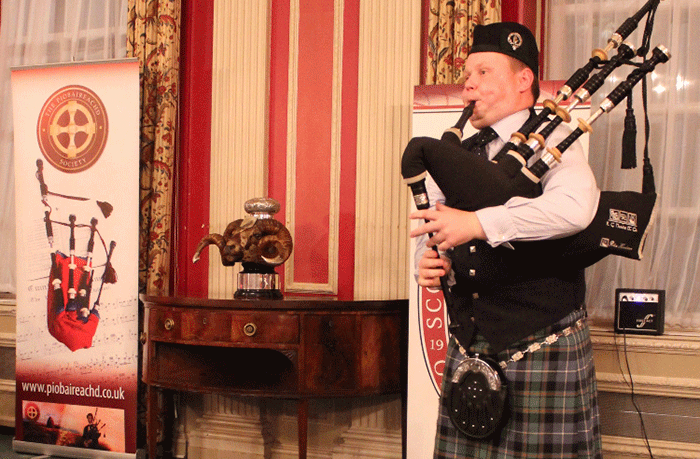
Jack Lee, that stalwart of the competition circuit, was asked to play ‘Lord Lovat’s Lament’. He gave us an excellent Ground and Var 1 on a well tuned pipe. Maybe his chanter volume was a little too loud for the drone sound, but this is a minor criticism of a beautifully played tune.
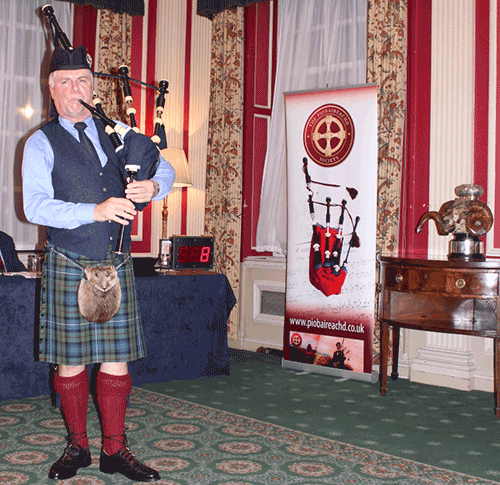
Next came Alasdair Henderson and ‘The Battle of Auldearn No2’. On a well tuned pipe he proceeded through the Ground and Var 1 with great attack and tempo. He grabbed our attention from the start and maintained it all through the tune. Perhaps, in what was a beautifully played tripling variation, he played just one indistinctly, but this is to be carping of a fine tune. Again, from my notes at the time, I had Alasdair as a contender.
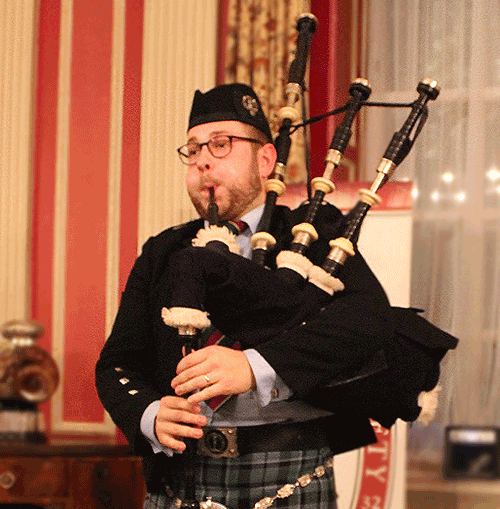
‘Scarce of Fishing’ by Glenn Brown was another good tune but was the ground too slow? Whatever, after this his tempo was just right, though maybe one could criticise him in that he did not vary the pace enough in this great but lengthy piece.
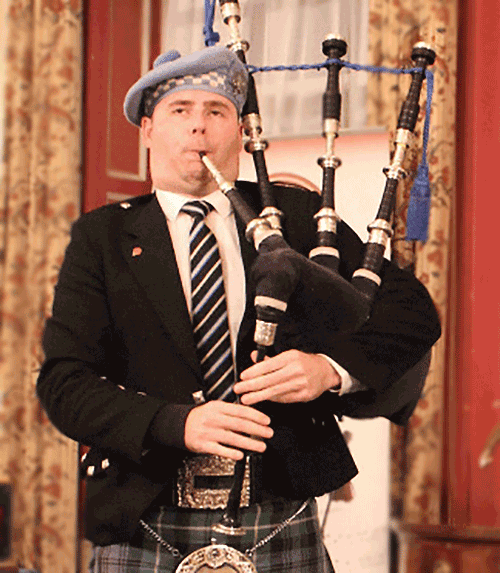
Niall Stewart played ‘Lachlan MacNeill Campbell of Kintarbert’s Fancy’. This is another long tune and was until some time ago a favourite on the boards but has now seemed to slip in popularity. Niall paced the tune well but to my ear had a sharp top A which, I suggest, put him out of contention. After all, in a contest of this calibre the judges have to look for any excuse to exclude players.
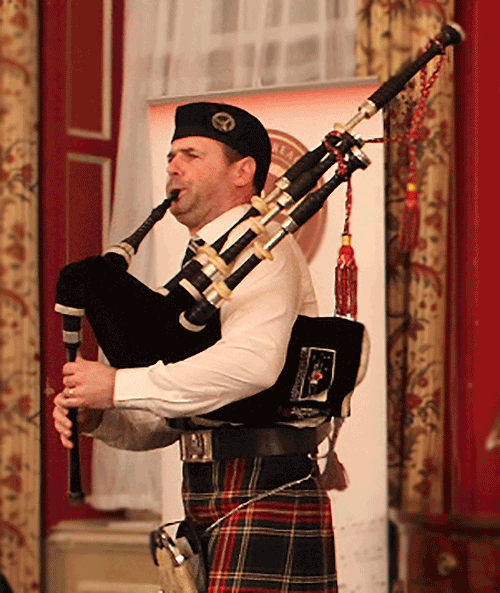
Iain Speirs probably had the most testing piobaireachd to present to us, the great ‘Nameless’ tune, ‘Cherede darievea’. This sets the piper nearly every technical test in the book. Iain’s pipe was just super and his presentation magnificent. His pacing of the variations, of which there are many, was an object lesson to any young player in the audience. Was there a slight error in one of the taorluath movements? Maybe, but it did not take away from the playing we were listening to – one of the best presentations of this tune I am ever likely to hear. My own notes, written at the time, had Iain in full contention.
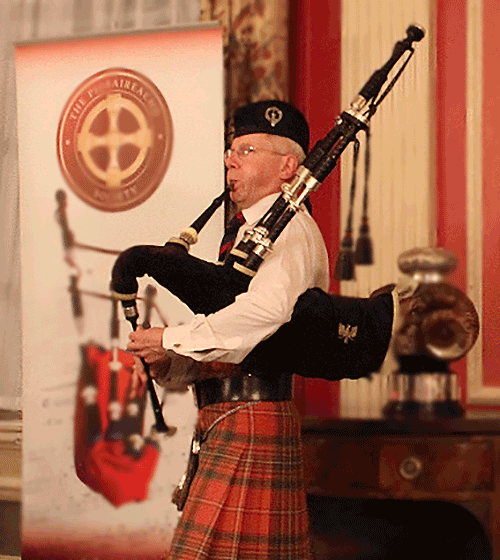
Last to play was Dr Peter McCalister with ‘The Earl of Seaforth’s Salute’, one of the very great ceol mor in our repertoire and often heard in recital and around the games. It is a very difficult tune to pace correctly and the pipe has to be just right. The high Gs, of which there are many, find out many a piper. However Peter’s pipe was excellent from start to finish. He played on the highest pitched instrument of the evening, but it was in perfect tune throughout. Again my note at the time had Peter in contention and I am relieved the judges thought so too!
After a long period of reflection the judges decided on the following result
1st Callum Beaumont, 2nd Iain Speirs, 3rd Alasdair Henderson, 4th Glenn Brown, 5th Dr Peter McCalister.
- All pictures courtesy the Scottish Piping Society of London.


















